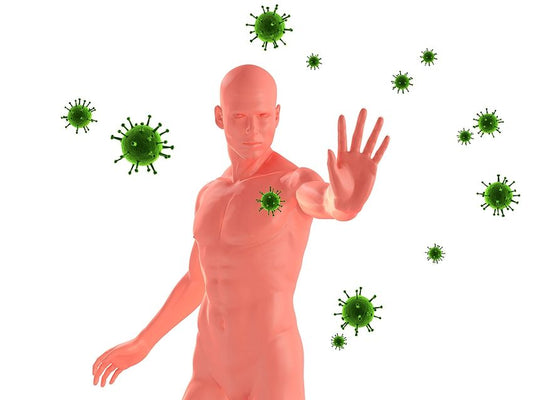The immune system is one of the largest and most complex systems in your body, and keeping it happy and healthy can be a handful considering how sensitive it can be to environmental threats.
But the reason some of us are hopping on the cold & flu bus every time that season rolls around is because we aren’t doing what we need to keep our immune system healthy in the first place.
So, that means that when your friend sneezes near you, your immune system isn’t strong enough to fight back, and you end up sick as a dog.
The obvious solution to this problem is to strengthen your immune system, but how do you do that?
Aside from good lifestyle practices like eating healthy, exercising daily, managing stress, and getting enough sleep, doubling up on immune-boosters ensures your immune system had what it needs, when it needs it.
It’s like giving your body premium fuel, knowing that it’s about to perform like nothing you’ve ever seen before.
With that said, let’s dive into what you need to know about immune-boosters and the best vitamins to take to support immune function.
Why Do We Need Immune Support?
Wouldn’t it be nice if supplementation didn’t have to be a thing? If all the food we eat was enough to keep our body nourished and thriving…
It’s a goal that one day we hope to achieve, but in the meantime, there are plenty of factors that interfere with our body’s nutrient reserves and leave all of our systems, especially the immune system, at risk of reduced function.
But when it comes to why immune-boosters should be a staple in your supplements stack, there are four key reasons:
1. Stress
Chronic stress is one of the heaviest hitters when it comes to weakened immunity. There is a bi-directional relationship between the central nervous system (CNS) and the endocrine and immune systems, and it’s been well established that stress can cause immune dysregulation across several areas of the humoral and cellular immune responses 1.
The release of hormones during the stress cascade is the biggest interferences with immune function. Cortisol is released when your body is subjected to major stressors. It functions to down-regulate body functions that aren’t necessary to your immediate survival and up-regulate those that are.
Unfortunately for the immune system, it’s lumped in with the non-essentials. So, chronic stress means chronically high cortisol and chronic suppression of immune function.
2. Poor Nutrition
We’d love to think that the vitamins and minerals our immune system needs can be obtained only through food, but it’s a bit of a far stretch.
Not only is the food we eat substantially less nutritious than what was around 50 years ago due to mass farming and soil depletion, but most people eat a diet high in processed foods and sugar, and low in vitamins and minerals found in fruits, vegetables, and other nutrient-dense foods.
3. Dietary Restrictions
For people that follow a plant-based diet, this is a big one for some key nutrients needed for immune function. In many plant foods, we find something called anti-nutrients—compounds that inherently block the absorption of key nutrients 2.
That’s things like lectins, phytates (phytic acid), phytoestrogens, tannins, and oxalates that interfere with the absorption of calcium, iron, zinc, and iodine.
They’re most common in some of the highest consumed vegan foods—beans and legumes, raw vegetables, nuts, seeds, cereal grains, pseudo-grains, and root veggies.
4. Poor Lifestyle Habits
We all lead busy lives, and, understandably, sometimes we don’t support our bodies in the way they need, but when we’re constantly stressed, eating poorly, not sleeping enough, and not exercising, the body isn’t getting anywhere close to what it needs to be healthy and thrive.
However, it’s important to keep in mind that immune supplements won’t negate an unhealthy life, but when you make lifestyle changes conducive to supporting your overall health and well-being, a good supplement protocol can take you the extra mile.
The Best Vitamins To Support Immune Function
Vitamin D
As one of the most powerful vitamins of the bunch, vitamin D plays a critical role in virtually every system in the body, including the immune system.
It’s involved in both the innate (immediate) and adaptive (long-term, acquired) immune responses, and it’s not only the vitamin D receptor (VDR) that most cells express, but also the gene required to synthesize vitamin D3 3.
Vitamin D plays an important role in supporting some of the key immune cells like monocytes and macrophages, along with modulating levels of inflammation to promote a healthy immune response 4.
Studies also suggest that vitamin D deficiency is linked to an increased risk of developing autoimmune conditions like MS, rheumatoid arthritis, and diabetes 5.
This may be partly because of vitamin D’s role in regulating the innate and adaptive responses to protect cells against immune hypersensitivity.
Zinc
Zinc is a powerhouse when it comes to immune support. It’s required for proper immune cell development, communication, and plays a key role in the inflammatory response.
Not to mention that it also offers a protective function to the tissue barriers in the body, which are required to prevent external pathogens from entering 6.
A zinc deficiency has been shown to impact immune function profoundly. It affects the homeostasis of many immune cells, leading to impaired formation, activation, and maturation of lymphocytes, disrupted intercellular communication via cytokines, and weakened innate immune defenses 7.
What’s more, supplementing with zinc may reduce the duration of colds because of its powerful antiviral properties.
Vitamin C
Vitamin C and immune function go hand in hand. It’s that glass of OJ your parents gave you when you were sick, or the fruits and veggies people tell you to consume in abundance to avoid the common cold.
It plays a supporting role in the function of many immune cells and enhances their ability to protect the body against invading pathogens.
Vitamin C supports epithelial barrier function against pathogens and, as a powerful antioxidant, promotes oxidant scavenging activity of the skin to protect the body against environmental oxidative stress 8.
But it’s also an essential part of the cellular clean-up crew that helps to rid the body of damaged and worn-out cells and replace them with new, more functional ones.
A deficiency in vitamin C has been linked to impaired immune function and a higher susceptibility to illness and infection.
And interestingly, it goes both ways. Infections have a significant impact on vitamin C levels due to enhanced inflammation and metabolic requirements for the nutrient 8.
Selenium
Selenium probably isn’t a nutrient you think about for immune health, but it’s no less important than the other guys.
Due to its incorporation into selenoproteins, selenium is involved in regulating levels of inflammation, oxidative stress, and other cellular processes in virtually all body tissues and cell types, including those of the innate and adaptive immune systems 9.
Research finds a link between selenium deficiency and poor immune function due to its presence in many tissues involved in immune responses, including the liver, spleen, and lymph nodes 10.
Insufficient levels impair the function of critical immune cells like B and T cells, lymphocytes, and natural killer (NK) cells.
Iron
The role of iron in supporting blood production is one of the most well-known roles, but it also plays a critical role in immune function, although the mechanism is not entirely understood.
Studies find that iron deficiency affects the body’s capacity to mount an appropriate immune response because it’s required for the proliferation and maturation of immune cells, especially lymphocytes, which are associated with mounting a specific response to infection 11.
A deficiency increases susceptibility to illness and infection because it compromises your body’s non-specific immune response—the part of the immune system that acts as a barrier to protect your body from external threats that can cause disease.
Vitamin E
As a potent fat-soluble antioxidant, vitamin E is found in the highest concentration in immune cells compared to all other cells in the blood, making it one of the most powerful and effective nutrients to modulate immune function.
It modulates the function of T cells by directly impacting membrane integrity, signal transduction, and cell division, but also indirectly influencing inflammatory mediators produced from other immune cells 12.
While it plays a role in mitigating the risk of all infections, vitamin E has specific importance in reducing susceptibility to infectious diseases like respiratory infections and allergy conditions like asthma.
It’s also a powerhouse for regulating immune function due to its protective effect against oxidation of polyunsaturated fatty acids that are concentrated in immune cell membranes and are highly susceptible to oxidative damage due to their high metabolic activity and normal defense against pathogens 12.
Final Thoughts
While all these nutrients are widely available in food sources, ensuring you hit your targets for each one of them daily can be a hassle.
Rather than fighting to remember or setting timers on your phone to eat your nutrients, stack up two of the most powerful supplements for boosting immune function—Performance Lab PL-Immune and Performance Lab NutriGenesis Multi.

Performance Lab® PL-Immune™ is an all-in-one supplement formulated to address and support every aspect of your immune system. It restores, strengthens, and powers up immune cells to help them coordinate, multiply, and perform.
Whatever the immune stress is, PL-Immune supplies broad-range support to help your immune system fight, adapt, and evolve to best defend you.
And with NutriGenesis Multi, you’re getting full-spectrum support for every body system.

With 17+ essential vitamins and minerals required for optimal physical and mental performance, Multi helps restore depleted nutrient levels, support balanced hormones, and provide foundational nutritional support for healthy whole-body biological performance.
It’s a simple stack designed to maintain immune performance with the cleanest, safest, and most effective nutrients possible.
References
- R Glaser, J Kiecolt-Glaser. How stress damages immune system and health. Discov Med. 2005;5(26):165-169.
- W Petroski, DM Minich. Is There Such a Thing as “Anti-Nutrients”? A Narrative Review of Perceived Problematic Plant Compounds. 2020;12(10):2929.
- DD Bikle. Vitamin D and immune function: understanding common pathways.Curr Osteoporos Rep. 2009;7(2):58-63.
- M Di Rosa, M Malaguarnera, F Nicoletti, L Vitamin D3: a helpful immuno-modulator. Immunology. 2011;134(2):123-139.
- KL Munger, LI Levin, BW Hollis, NS Howard, A Ascherio. Serum 25-hydroxyvitamin D levels and risk of multiple sclerosis. 2006;296(23):2832-2838.
- I Wessels, M Maywald, L Rink. Zinc as a Gatekeeper of Immune Function. 2017;9(12):1286.
- M Maares, H Zinc and immunity: An essential interrelation.Arch Biochem Biophys. 2016;611:58-65.
- AC Carr, S Vitamin C and Immune Function.Nutrients. 2017;9(11):1211.
- PR Hoffmann, MJ Berry. The influence of selenium on immune responses.Mol Nutr Food Res. 2008;52(11):1273-1280.
- E Laird, M Ward, E McSorley, JJ Strain, J Vitamin D and bone health: potential mechanisms.Nutrients. 2010;2(7):693-724.
- A Soyano, M Gó Participación del hierro en la inmunidad y su relación con las infecciones . Arch Latinoam Nutr. 1999;49(3 Suppl 2):40S-46S.
- EW Lewis, SN Meydani, D Wu. Regulatory role of vitamin E in the immune system and inflammation.IUBMB Life. 2019;71(4):487-494.














